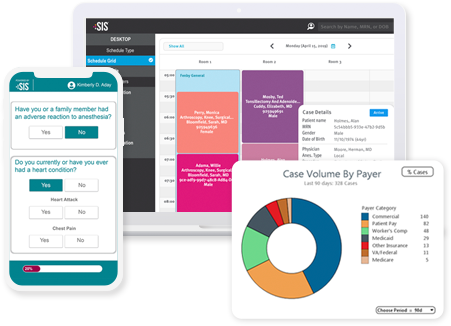 While ASCs have long asked patients to complete surveys following procedures, administrators and staff often paid insufficient attention to the results.
While ASCs have long asked patients to complete surveys following procedures, administrators and staff often paid insufficient attention to the results.
There are several possible explanations why, including:
- the assumption that if the outcome was positive, the overall experience was as well;
- survey questions were broad and/or ratings used a scale system (e.g., 1-5) that did little to help pinpoint specific opportunities for improvement; and
- the belief that the patient experience, outside of the surgical outcome, would have little impact on procedure volume since cases were typically directed to the ASC via physician referral.
But times have changed, and now ASCs striving to improve clinical, financial, and operational performance would be wise to take a closer look at their patient surveys. Areas of focus should include what questions are asked, how questions are asked, how information provided by patients is assessed, and what processes are in place for staff to take actions based on lessons learned.
What exactly has changed that necessitates such a different perspective on surveys? Consider the following:
- Reimbursement is increasingly tied to patient satisfaction.
- Patients have multiple platforms to discuss experiences with their friends, family members, and communities (e.g., social media, review websites).
- Competition for physicians, staff, and patients is increasing, with good or bad patient experiences potentially influencing facility choices.
- Regulators and surveyors expect healthcare organizations to continually work to improve their performance (i.e., quality assurance performance improvement programs).
- A growing number of ASCs are offering cash-based services, which requires individual patient choice of the facility.
Here is a summary of 10 benefits linked to a robust ASC patient survey program.
1. Identify strengths, weaknesses, and priorities
If leveraged effectively, patient surveys can help an ASC identify specific aspects of its operation to assess more closely and look for possible opportunities for improvement and staff recognition. They can also allow an ASC to establish reliable baseline data about performance.
When changes are implemented, surveys can help determine whether new processes are having their desired effects.
2. Improve staff training and education
Identifying areas of poor or suboptimal performance can help an ASC evaluate how it provides staff training to determine what aspects of an education and competency program should undergo review and possible revisions.
3. Increase reimbursement
A recent article in Forbes notes that "… health insurers including Anthem, UnitedHealth Group, Aetna and Cigna [have shifted] more than half of their reimbursement to value-based models that pay doctors based on quality of care delivered and the health outcomes of their patients."
While such value-based models are not yet commonplace in the ASC industry, this observation points to the fact that payers are looking to reward providers who deliver exceptional care. ASCs with high patient satisfaction scores can bring this data to the negotiating table to help make an argument to payers for better managed care contracts.
4. Avoid reimbursement cuts
On the flip side, ASCs that cannot effectively demonstrate that they deliver great care and a positive patient experience may struggle to secure the reimbursement increases from payers they desire.
5. Avoid reimbursement penalties (eventually)
The Centers for Medicare & Medicaid Services (CMS), in its 2019 proposed payment rule for ASCs and hospital outpatient departments, chose not to recommend mandating the implementation of the Consumer Assessment of Healthcare Providers and Systems Outpatient and Ambulatory Surgery Survey (OAS-CAHPS) under the ASC Quality Reporting (ASCQR) Program. But it is likely that participation in OAS-CAHPS will eventually become mandatory and carry with it CMS payment update penalties for ASCs that fail to meet ASCQR Program requirements.
CMS stated it will continue to ask ASCs to participate in voluntary reporting for the rest of 2018 and for 2019. When OAS-CAHPS is mandated, ASCs that have voluntarily participated in OAS-CAHPS should already have the processes in place to meet the requirements and evade penalties.
6. Strengthen internal and external benchmarking
Patient surveys can become a valuable component of an ASC's internal and external benchmarking efforts. As noted earlier, an ASC can compare survey results before and after implementing a change to measure whether the work completed had its desired effect(s).
From an external benchmarking perspective, ASCs can take their patient survey data and compare it to the data of other ASCs, whether on an informal basis (such as with a self-developed network of ASC managers) or on a more formal basis (such as using a patient survey service).
7. Enhance physician recruitment
When ASCs are recruiting physicians, one topic of discussion inevitably concerns the patient experience. If physicians are going to refer cases to and perform procedures at an ASC, they will want to ensure patients receive the best possible care and outcome. Sharing patient satisfaction survey results can help bolster an ASC's position that it can deliver on these expectations and increase the likelihood of adding physicians to its medical staff.
8. Boost staff retention and recruitment
When patients and physicians express high satisfaction with their ASC experiences, staff satisfaction often rises as well. A positive environment that's more enjoyable and rewarding to work in can help keep current employees happy with their employment situation. Satisfaction data — from patients, physicians, and staff — can be provided in job postings to attract candidates and during interviews with prospective staff to enhance the appeal of working at the ASC.
9. Drive marketing
ASCs looking to increase brand awareness to help attract physicians, staff, and patients, can promote impressive survey results. They can do so by publishing satisfaction scores and patient testimonials on their website, in marketing collateral, on social media, and in the future on the CMS website.
10. Bolstered public perception
When ASCs act on what they learn from surveys, the patient experience should improve. And when ASCs deliver an exceptional experience, they can expect at least some patients to express their gratitude publicly on social media and websites offering the ability to rank an organization (e.g., Yelp, Google, Facebook). This will essentially serve as another form of marketing.
Maximizing an ASC Patient Survey
As we discussed, the use of patient surveys can provide ASCs with significant benefits. But to maximize these benefits over the long term, assessing surveys and their results must be unwavering areas of focus.
Surveys should undergo frequent review and possible revision to ensure questions asked and topics covered can help an ASC continue to identify areas for improvement. If an ASC performs consistently well on an area covered in the survey, it may be worthwhile to replace it with another area that has not received as much attention.
Survey results should receive consistent scrutiny, even when satisfaction scores are high and an ASC seems to be performing well. Close monitoring of results can help identify a potential problem or area of concern early, allowing an ASC to implement a fix and prevent the issue from impacting care for more patients. If review of survey results takes a back seat to other projects, problems can be missed and improvements may prove more difficult if the cause of the problem becomes a habit.
ASCs seeking assistance with developing and executing effective patient surveys can contract with a third-party company that specializes in assisting ASCs with setting up, running, and analyzing survey data. These companies, which will perform the bulk of the work for their clients, strive to accommodate patients and gather as much worthwhile data as possible by offering paper, electronic, and phone-based approaches to surveys. ASCs can make the most of such a partnership by selecting a company with a solution that can effectively interface with their existing software.
By treating patient surveys as an integral component of operations, ASCs can anticipate improvements that touch all aspects of their performance.

















